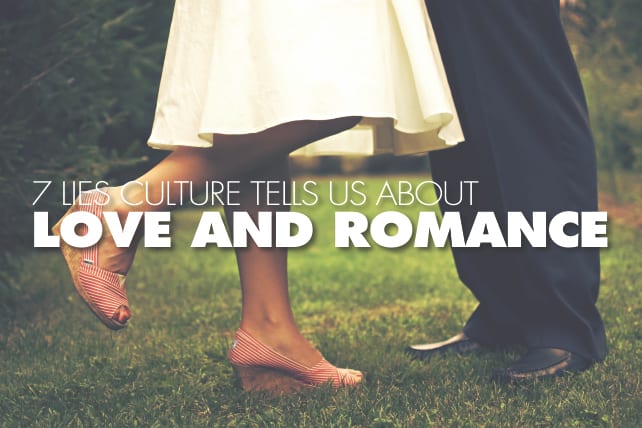I’m rounding the final turn in my 6th year of marriage. Despite the struggles Tiffani and I faced the last 12 months, I can say with certainty we’re closer and enjoyed one another more in year six than any year so far.
Why? First, struggles inevitably do one of two things: tear a relationship apart or pull it closer together. For that reason, I’m thankful for the hardships we’ve experienced. A deeper understanding of life and its meaning go through struggle and hardship.
Another factor leading to growth in our marriage – maybe a product of our struggles, I’m not sure – is the realization that most, maybe all, of what I believed about love, romance, and sex going into marriage was a lie.
I have years of movies, songs, books, and unfortunately the church, to blame for this. There’s no shortage of voices in our culture when it comes to love, and they speak quite authoritatively on all matters of love and romance: what to value in a relationship, how to handle conflict, what real love looks like, the importance of sex, and so on.
The cultural perceptions of love speak so loud, in fact, and with such consistency that we would be naive to think we don’t enter into romantic relationships with a picture based largely on our surroundings. “Love has a history,” and we’re influenced by the voices more than we realize.
For nearly five years of my marriage, I listened, and my marriage suffered. Chalk it up to perseverance or maturity, but this year I stopped listening. And while Tiffani and I have by no means arrived, our relationship is healthier today than ever.
Regardless of your position in life’s journey – married, dating, single, whatever – tuning out the cultural lies about love, romance, and sex is essential to experiencing healthy relationships, and, in particular, healthy marriages.
1. Love is a feeling.
Almost all cultural signs point to this dangerous lie, that love is something you fall in and out of, a volcanic eruption of emotions and passion.
After seven years of marriage, I can say with 100% certainty love is not a feeling. Some days, I feel like throwing a temper tantrum because this marriage thing is hard, really hard. Magically, however, I feel different the next day, or after sex. This is the reality of feelings. They come and go, kind of like the wind, except that’s giving feelings to much credit. The day Tiffani and I were married, we made vows to one another. Countless times, we’ve rested on our vows because that’s what love does, it never fails.
Love is more powerful than failure and disappointment, it perseveres through sin and even death. That version of love – the real one – doesn’t sell tickets or books. It’s not popular or trendy.
But really, what are we saying about love, and more importantly, God, if it rests on a foundation as weak and shallow as feelings?
2. Opposites attract.
I can almost hear my grandmother saying it now. “You know, son. It’s like they always say…opposites attract.”
Who is “they”?
In our culture, magnetic attraction, butterflies and such, is a confirmation of true love, almost as if values and commonalities are insignificant.
Tiffani and I are opposites in many ways, no doubt. I’m an introvert. She’s outgoing. My thoughts are scattered and abstract. She a planner. I’m mostly wrong. She’s mostly right. You get the idea.
But despite the many ways we’re different, it’s the one thing we agree on that brought us together (and continues to do so today).
God.
When I met Tiffani, the magnetic attraction was there. But I’m convinced we wouldn’t have made it without our common love for God. Don’t be fooled by the opposites attract myth. Strong, stable relationships need commonalities to survive, specifically a common faith.












